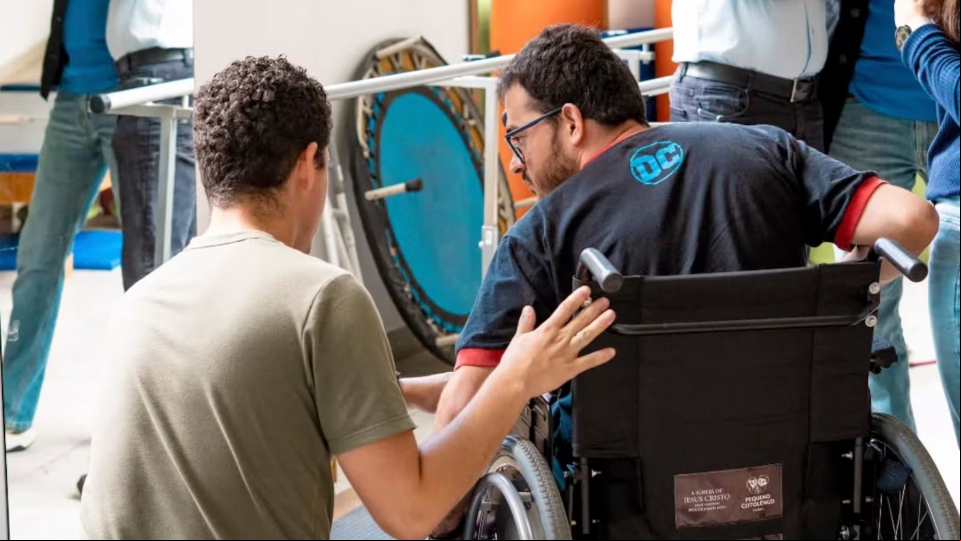
Wheelchair-Brazil
A man receives a wheelchair from Pequeno Cotolengo Paulista in Cotia, Brazil. The Church of Jesus Christ of Latter-day Saints began a long-term donation of 300 wheelchairs to Pequeno Cotolengo Paulista spring 2025. The Church of Jesus Christ of Latter-day Saints 2025 by Intellectual Reserve, Inc. All rights reserved.This story appears here courtesy of TheChurchNews.com. It is not for use by other media.
By Jackie Asher, Church News
From a children’s cancer hospital to donations for flood victims, The Church of Jesus Christ of Latter-day Saints has contributed to multiple humanitarian projects in various parts of Brazil, as reported on the Autossuficiência Brasil, or Self-Reliance Brazil, Facebook page.
1. Digital Mammogram in São Paulo
On May 29, the Church donated a digital mammography machine to Santa Casa de Misericórdia (Holy House of Mercy) in Guaratinguetá, São Paulo.
According to the hospital’s istrative director, Andre Monteiro, this new machine is very accurate in the early detection of breast cancer.
“This way, we can speed up care, enabling greater hope for women in the face of disease,” Monteiro said.
Nádia Magalhães Meirelles, the Guaratinguetá secretary of health, said digital mammograms help diagnose the disease quickly, allowing women to avoid painful treatments.
With the new machine, the hospital is now equipped to perform 450 exams each month.
Paulo Araújo, self-reliance manager for the Brazil Area of the Church, said nearly 100 projects like this one are in progress all over Brazil, with a ”focus and emphasis on the areas of education and health.”
2. Pediatric ICU in Rio Grande do Norte
On May 16, Elder Mark D. Eddy, General Authority Seventy and Second Counselor in the Church’s Brazil Area Presidency, announced the Church’s for a new pediatric intensive care unit at a hospital in Natal, Rio Grande do Norte.
The project aims to address the disparity in childhood cancer survival rates between Brazil and high-income countries. In nations like the U.S., the childhood cancer survival rate exceeds 80%. In other countries in the Americas, the rate is closer to 55%.
3. Neonatal R Course in Maranhão
The Church sponsored a neonatal R course for 54 Indigenous midwives on May 14 and 15 in Barra do Corda, Maranhão, in northeast Brazil. The Church covered the cost of individual kits, food and travel for each midwife.
The Church has been involved with several initiatives promoting maternal-child health in Brazil’s most vulnerable regions through a decade-long partnership with the Brazilian Pediatric Society.
The Brazilian Pediatrics Society, Maranhão Indigenous Special Health District and state government assisted in organizing and promoting the event.
The Church sponsored similar trainings in 2024 in Boa Vista, Roraima; Manaus, Amazonas; Macapá, Amapá, Feira de Santana, Bahia; and Arapiraca, Alagoas. There are plans to carry out trainings in Governador Valadares and Teófilo Otoni, Minas Gerais; Cariacica, Espírito Santo; Petrolina, Pernambuco; and Pinheiro, Maranhão, in 2025.
4. Wheelchair donation in São Paulo
This spring, the Church began a long-term project ing Pequeno Cotolengo Paulista, a social welfare center in Cotia, São Paulo. The project will include the donation of 300 wheelchairs over the next year, as well as the training of nine physiotherapists.
The project is part of the Church’s worldwide wheelchair program, which aims to provide more mobility, independence and dignity to people with disabilities.
Each donated wheelchair is adapted to meet the individual’s specific needs, allowing for mobility, comfort and autonomy. The trained physiotherapists will ensure proper use of equipment and safety of wheelchair recipients.
5. Mobile Mammography Unit in São Paulo
In partnership with Américas Amigas, the Church donated a mobile mammography unit to the Hortolândia Brazil Stake in São Paulo this spring.
During the week of the donation, more than 300 women received free examinations in the unit, which is equipped with a digital mammogram system, ultrasound workstation, examination room and chair lift to ensure accessibility and comfort. The unit is expected to travel around the country, helping detect breast cancer, one of the leading causes of mortality among women in Brazil.
Local authorities, including Hortolândia Mayor Zezé Gomes, attended the opening ceremony.
6. Amigos do Bem in São Paulo
In May, Alcione Albanesi, founder of Amigos do Bem (Friends of Good), met with the Brazil Area Presidency to discuss the Church’s collaboration with Amigos do Bem.
Through this collaboration, the Church has donated 10 school buses, 30,000 basic food baskets, three pipe trucks, one truck, one ambulance, one transport van, two tractors and several solar power systems. These donations have helped to improve mobility, ensure access to water, strengthen education and provide a higher quality of life for more than 100,000 people.
In this meeting, the Brazil Area Presidency and Albanesi discussed new opportunities for collaboration and defined strategies for bringing dignity, education, health and sustainable development to families in Brazil.
7. Donations to Flood Victims in Ceará
After several families lost everything — furniture, clothes and personal documents — to flooding, the Church donated 1,000 hygiene and cleaning kits, 500 mattresses and 500 blankets to families in Caucaia and other Ceará cities in April 2025.
In April, the state of Ceará in the northeastern part of Brazil and bordering the Atlantic Ocean received above-average rainfall, putting more than 100 towns on alert for flood risks and other associated hazards.
Hundreds of people were displaced from their homes and taken to a municipal school, where they received from public organizations and donations from the community.
Copyright 2025 Deseret News Publishing Company.





